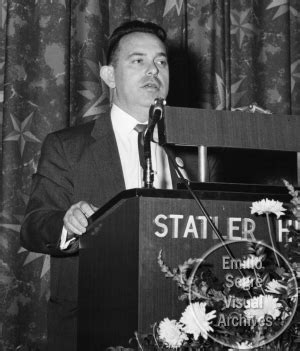A Quote by Saint Augustine
His knowledge is not like ours, which has three tenses; present, past, and future. God's knowledge has no change or variation.
Related Quotes
These tenses-past, present and future-are not the tenses of time; they are tenses of the mind. That which is no longer before the mind becomes the past. That which is before the mind is the present. And that which is going to be before the mind is the future. Past is that which is no longer before you. Future is that which is not yet before you. And present is that which is before you and is slipping out of your sight. Soon it will be past.
Now I wonder what our knowledge has in common with God's knowledge according to those who treat God's knowledge... Is there anything else common to both besides the mere name? ...there is an essential distinction between His knowledge and ours, like the distinction between the substance of the heavens and that of the earth.
Surely knowledge of the natural world, knowledge of the human condition, knowledge of the nature and dynamics of society, knowledge of the past so that one may use it in experiencing the present and aspiring to the future--all of these, it would seem reasonable to suppose, are essential to an educated man. To these must be added another--knowledge of the products of our artistic heritage that mark the history of our esthetic wonder and delight.
Past, n. That part of Eternity with some small fraction of which we have a slight and regrettable acquaintance. A moving line called the Present parts it from an imaginary period known as the Future. These two grand divisions of Eternity, of which the one is continually effacing the other, are entirely unlike. The one is dark with sorrow and disappointment, the other bright with prosperity and joy.... Yet the Past is the Future of yesterday, the Future is the Past of to-morrow. They are one-the knowledge and the dream.
We human beings have enormous difficulty in focusing on the present; we always thinking about what we did, about how we could have done it better.... or else we think about the future, about what we're going to do.... But at this precise moment, you also realize that you can change your future by bringing the past into the present. Past and future only exist in our mind. The present moment, though, is outside of time, it's Eternity.... It isn't what you did in the past the will affect the present. It's what you do in the present that will redeem the past and thereby change the future.
To know God and to find one's full satisfaction in that knowledge is the ultimate goal of Christian experience. The Lord's greatest delight comes when His people discover the ultimate value lies in the knowledge of God. Nothing in the material world can complete with the delights that are present in His Person.
Try to find the real tense of the report you are reading: Was it done, is it being done, or is something to be done? Reports are now written in four tenses: past tense, present tense, future tense, and pretense. Watch for novel uses of CONGRAM (CONtractor GRAMmer), defined by the past imperfect, the present insufficient, and the future absolutely perfect.
No one has yet discovered or ever shall discover what God is in His nature and essence... we shall, in time to come, 'know as we are known' (I Cor 13:12). But for the present what reaches us is a scant emanation, as it were a small beam from a great light - which means that any one who 'knew' God or whose 'knowledge' of Him has been attested to in the Bible, has a manifestly more brilliant knowledge than others not equally illuminated. This superiority was reckoned knowledge in the full sense, not because it really was so, but by the contrast of relative strengths.









































